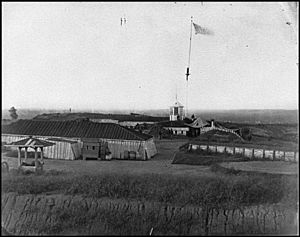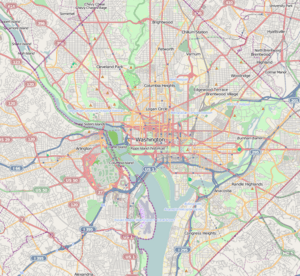Fort Lincoln (District of Columbia) facts for kids
Quick facts for kids Fort Lincoln |
|
|---|---|
| Part of the Civil War defenses of Washington, D.C. | |
| Washington, D.C. | |

Interior view of Fort Lincoln in 1865
|
|
| Coordinates | 38°55′31″N 76°57′04″W / 38.92528°N 76.95111°W |
| Type | Earthwork fort |
| Site information | |
| Controlled by | Union Army |
| Condition | Residential Area |
| Site history | |
| Built | 1861 |
| Built by | 11th Massachusetts Infantry regiment |
| In use | 1861–1865 |
| Materials | Earth and timber |
| Demolished | 1865 |
| Battles/wars | American Civil War |
Fort Lincoln was a temporary fort built during the Civil War. It was one of many forts that protected Washington, D.C. from the Confederate Army. The Union Army built it in 1861. These forts were made of earth and wood.
Fort Lincoln was located in the northeast part of Washington, D.C. It was part of a chain of forts. These forts stretched from west to east. They included Fort Slocum, Fort Totten, Fort Slemmer, Fort Bunker Hill, Fort Saratoga, Fort Thayer, and Fort Lincoln.
A large gun placement called Battery Jamson was also nearby. It was located east of Fort Lincoln. This battery helped protect the area. It overlooked the Anacostia River.
Contents
Building Fort Lincoln
Work on Fort Lincoln began on August 26, 1861. Soldiers from the First Regiment Massachusetts Volunteer Infantry built it. The fort was located near the border of Washington, D.C. and Prince George's County, Maryland.
It was named after President Abraham Lincoln. This happened on September 30, 1861. At that time, the fort was about 2.5 miles from the city.
The fort had a perimeter of about 466 yards. It was designed to hold 34 guns.
Fort Lincoln's Guns
Fort Lincoln was armed with many different types of cannons. These guns were important for defending the city.
Here are some of the guns the fort had:
- Eight 6-pounder field guns
- Four 12-pounder field guns
- Five 24-pounder James guns
- Six 32-pounder sea-coast howitzers
- Two 24-pounder howitzers
- Two 8-inch howitzers
- Two Coehorn mortars
- One 10-inch mortar
- Four 30-pounder Parrott guns
- One 100-pounder Parrott gun
Soldiers at Fort Lincoln
Many different groups of soldiers were stationed at Fort Lincoln. They protected the fort and the city.
Some of the troops included:
- Soldiers from the First Regiment Massachusetts Volunteer Infantry
- The 11th Regiment Massachusetts Volunteer Infantry
- The 2nd New Hampshire Volunteer Infantry
- The 26th Pennsylvania Infantry
- The 3rd Regiment Massachusetts Volunteer Heavy Artillery
- Battery D, 1st Rhode Island Light Artillery
- Company A, Maine Coast Guards
- Soldiers from the New Hampshire Heavy Artillery
- The 150th Ohio National Guards
A group of about 500 cavalry soldiers was also nearby. They were from the 7th Michigan Volunteer Cavalry Regiment. On July 12, 1864, these cavalry soldiers fought with enemy cavalry. This happened near Bladensburg, Maryland. Captain T.S. Paddock was in charge of the fort at that time.
Battery Jameson: A Nearby Helper
Battery Jameson was built in 1862. It was an outer defense for Fort Lincoln. It was located on a high point in Prince George's County, Maryland.
The battery was named after Major General Charles Davis Jameson. He passed away in November 1862. Battery Jameson was at the end of the defense line. It overlooked the Eastern Branch of the Potomac River, which is now called the Anacostia River. There were also other smaller batteries nearby.
Fort Lincoln Today
Today, most of what remains of Fort Lincoln is located within the Fort Lincoln Cemetery. This cemetery is in Prince George's County, Maryland. You can visit the site.
A special marker has been placed there. It helps people remember the fort. Only a flag, some earthworks, and three cannons remain.
Images for kids
 | Shirley Ann Jackson |
 | Garett Morgan |
 | J. Ernest Wilkins Jr. |
 | Elijah McCoy |









